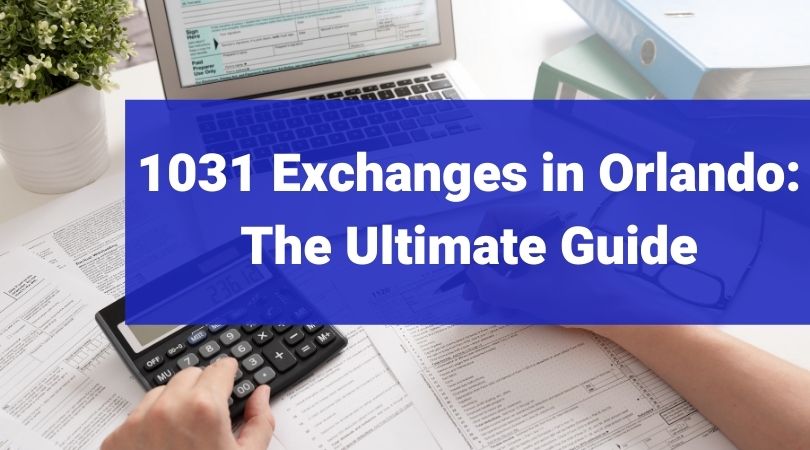
Selling a property in Orlando, whether it be a business property or an investment property, will usually attract capital gains tax. And this will usually range anywhere between 15% and 30% in taxes. The 1031 tax-deferred exchange is a method in which savvy investors use in order to avoid paying such taxes.
Section 1031 of the Internal Revenue Code allows investors to swap one property for another. As long as the property you’re swapping it for is “like-kind”, you may be able to defer the capital gains. And you may be able to take advantage of this an infinite number of times.
It is no secret that the 1031 exchange has contributed to the success of countless real estate barons. This article will go over the basics of 1031 Exchange in relation to Orlando properties.

Types of Exchanges
The first thing to know about 1031 exchanges is that different types of exchanges exist. The two most common ones are delayed exchange and reverse exchange.
Delayed Exchange:
In a delayed exchange, you’ll have up to 45 days from the date of relinquishing the property to identify the replacement property. You’ll also have 180 days to close the escrow on the replacement property.
You’ll have an option to identify more than three properties and close on at least one of them. This exchange type is the most common.
Reverse Exchange:
A reverse exchange can be a bit more complex than a delayed exchange. It occurs when a taxpayer acquires a replacement property before transferring the relinquished one. A “pure” reverse exchange is one in which a taxpayer owns both the property they have relinquished and the one they are replacing it with at the same time.
Requirements for a Successful 1031 Exchange
- Qualifying Property: Properties that qualify must either be for investment or business purposes. They may include rental properties, raw land, shopping centers, farms, trailer parks, retail stores, or new construction.
- Proper Purchase: Both the relinquished and replacement property must both be held for reproductive purposes. Here “reproductive” means the property is either used for investment or for business/trade. A personal residence, for instance, will not qualify for a 1031 exchange.
- Like-Kind: The property for replacement must be “like-kind” to the one being relinquished. For instance, you may be able to exchange a commercial property for land; and land for a single-family home – and so forth.
- Exchange Requirement: The property being relinquished must be swapped for a property that’s of equal or higher value. If the replacement property is of less value, there will be some tax due.
- Time Requirements: Once the sale is closed, you’ll have up to 45 days to identify 3 “like-kind” properties for replacement. Next, once you sell your property, you’ll have up to 180 days to close on the purchase of the replacement property.
- Taxpayer Name: The name on the tax return and the title of the property being relinquished must be similar to those on the buying documents for the replacement property. An exception to this exists, however. And that is if you use a single-member limited liability company.
Exchange Expenses vs. Non-Exchange Expenses
According to the IRS, for closing costs to be paid out of exchange funds, the costs must be considered Exchange Expenses. Exchange Expenses, or Normal Transactional Costs, are classified as a reduction of boot. Non-exchange expenses, on the other hand, are considered taxable boots.
Examples of non-exchange expenses include security deposits, assumption fees, application fees, and property liability insurance. Examples of exchange expenses include statement fees, document fees, processing fees, title insurance fees, legal fees, transfer taxes, and sales commission.

Boot
The term “boot” refers to property that is non-like-kind received in an exchange. Boot may take different forms. It can take the form of debt relief, an installment note, cash or personal property that’s valued at “fair market value.”
Does boot invalidate a 1031 exchange? No, it doesn’t. What it does, however, is introduce a taxable gain in the transaction. As opposed to a “fully tax-deferred exchange”, you’ll now have completed a “partially tax-deferred exchange.”
The following are some examples of boot:
- Exchanging a property that is intended for personal use and not for investment or trade/business.
- Exchanging a property that isn’t “like-kind”. An example would be exchanging personal property for real property.
- Taking proceeds from the exchange in form of a note.
- Exchanging a property that does not qualify, such as notes, bonds, stocks, or partnership interests.
- Cash proceeds that are taken from the escrow, at the settlement, or any that remains after the exchange ends.
You can avoid boot in three main ways. One, make sure the replacement property is of equal or greater value than the property you’re relinquishing. Two, spend all the net equity. And three, don’t receive a property that doesn’t qualify as a like-kind.
When to Do a 1031 Exchange
The perfect time for a 1031 exchange is when you belong to a high tax bracket that would need you to pay huge tax amounts.
You can keep investing and exchanging properties an infinite number of times. And the only time you’d need to pay taxes would be when you decide to sell it for cash. Done multiple times, this can save you humongous amounts of money.
When not to Do a 1031 Exchange
It wouldn’t make much sense to do a 1031 exchange if you are in a very low tax bracket. Ideally, you’d want to hold off the exchange and just make the tax payments for that year as they will be low.
This strategy is especially helpful if you’re anticipating making more money in the future.
In addition, if you make losses that year, there would be no capital gains which would warrant payment of taxes. As per the IRA Code, low-income individuals are exempt from taxes on capital gains made. Therefore, it wouldn’t make sense for you to do an exchange at that point.

Final Thoughts
There you have it, a basic overview of what 1031 exchanges are all about. Finding properties in Orlando, Florida is a smart investment move.If you still have more questions, please consider hiring expert help, such as a professional property management company. RentSmart USA can help you navigate 1031 exchanges in Orlando, so call us today!